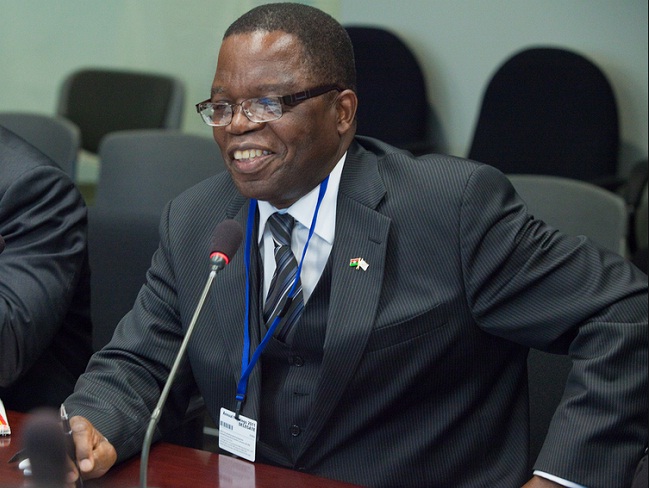Ken Lipenga could be cementing his legacy as potentially one of the weakest finance ministers in Malawi’s history.
The man of letters’ lack of backbone is especially dangerous for the current financial and economic times.
Granted, Lipenga took over leadership of the Malawi’s economy at a time it was already showing signs of malaise.
But his missteps, misstatements and miscarriage of his responsibilities have weakened him so much that he has little credibility, let alone political capital, left to midwife any fiscal deals to preserve public finance sanity and effectively lead President Joyce Banda’s economic management team. Any wonder his colleague, Leader of the House and Lands Minister Henry Phoya had to clarify the supplementary budget withdrawal on his behalf in Parliament on Friday?
So far, the results appear to back this narrative.
Currently, the country is saddled with a national budget that is under siege, an economy finding comfort in a recession and an exchange rate with a mind of its own.
On Lipenga’s watch, Malawi finds itself clutching a labour market that is running out of control, fuel prices that only look upwards, an inflation rate that has spiralled out of authorities’ grasp and high interest rates that are strangling growth, restraining consumption and adding insult to the injury that is the rising cost of living.
Under his guard, Malawi is anchored by a financial system that is shaking like a leaf and a social infrastructure so starved of funding that it is collapsing around us as evidenced by essential shortages in health, education and other social sectors.
The list of crisis-level challenges is long—all pointing to a Ministry of Finance leadership that is not courageous enough to sacrifice personal survival to speak truth to power and bring sanity to public finances.
The monumental problems dogging Malawi require a tough keeper of the fiscal purse who will take a position and stand by it or resign/get sacked if he or she encounters sharp and irreconcilable policy differences with the President.
Former finance minister Dr Matthews Chikaonda fell out of grace with the then president Bakili Muluzi when he fought to implement tough measures to boost public revenue and reign in spending.
Muluzi and the majority of his Cabinet vehemently opposed the plans, but Chikaonda stood his ground.
Chikaonda’s positions may not have been the best, but he believed in them enough to push for their implementation.
It cost him his job.
But the current chief executive officer of Press Corporation Limited (PCL) left government not only with his reputation intact, but enhanced.
Today, more than 10 years on, when Chikaonda opens his mouth to speak, the country’s ears flap, ready to listen.
Lipenga could have demonstrated the same steel.But he has not.
Lipenga’s weak handling of tough fiscal and economic policy issues does not stem from his lack of formal competences in economics and public finance management as some critics say.
Aleke Banda, Justin Malewezi, Louis Chimango, John Tembo and Dr Cassim Chilumpha, among others, had no formal training in economics, but they never had to endure the spectacular failures and embarrassment that Lipenga, despite his widely accepted intellect, has chalked at Treasury.
None of these leaders, at least during their different times at the helm of the Ministry of Finance, presided over scandals bordering on competence of the magnitude that have dogged Lipenga, one of the country’s highly regarded former media practitioners.
Since his DPP-marshalled revenue embellishment baggage, Lipenga has not recovered from that fiasco and the current budget crisis—that has seen him withdrawing the supplementary plan in an unprecedented move—does not help any attempts at regaining his mojo.
The best President Banda can do is to take the poor man out of his misery by replacing him with someone credible enough—both locally and internationally—to bring back respect and credibility to the Ministry of Finance and the rest of the public finance and economic management system.
Lipenga lost his credibility—and with it the needed self-confidence in the eyes of most MPs and the public at large—the day he was caught lying about MRA tax revenue, ironically, in his maiden midterm review report exactly a year ago during the Bingu wa Mutharika regime.
For this gross dereliction of duty, Lipenga should have been fired, but President Banda spared him in a show of confidence that left him too bruised, too grateful and, therefore, too vulnerable to exercise independent judgement and offer candid advice to the Head of State.
Surely, such a weakened Finance Minister cannot find the strength to challenge some of the extravagance the President has been indulging in, let alone the wild salary concessions to the unions and stand up to legislators baying for hefty fuel payouts.
Former Finance Minister Goodall Gondwe—now Economic Planning and Development Minister—refused to pay MPs’ fuel allowances during his time at Treasury —risking a contempt of court charge that would, and still can, land him in jail. But he saved taxpayers’ kwachas.
In the case of civil servants’ salary increases, it was clear that Lipenga was against the 67 percent increase— or anything close to that—that the Civil Service Trade Union (CSTU) demanded.
He said as much last week when he argued—with cold hard figures—that the economy cannot shoulder such a huge extra burden, especially in the middle of a financial year and anaemic growth.
But a day later, the country learned that President Banda, in a highly skewed compromise that awarded government workers a 61 percent pay rise that was not budgeted for and whose source Lipenga had no clue about, had succumbed to pressure.
Were Lipenga a strong enough Finance Minister, he would have stared the President in the face and told her that she had made a terrible mistake; that he would rather resign than implement a pay hike that would destabilise the national budget and rattle an already shivering economy.
He did not.
Instead, he has accepted the embarrassment of withdrawing the revised 2012/13 national budget of K476 billion (about $1.3bn) tabled in Parliament two weeks ago, which was a K67 billion (about $191m) jump from the K409 billion (about $1.2bn) approved last June.
The revised estimates came before the 61 percent salary ransom (civil servants had kidnapped Capital Hill in exchange for pay rise), which has thrown the financial plan so off balance that it has to be re-written, literally, to accommodate the new perks.
And who knows, Lipenga may even give ‘high fives’ all around to MPs who are demanding fuel allowance arrear payouts of roughly K10 million (about $30 000) each.
Thus, when the supplementary budget returns to Parliament next week or so, do not be surprised to see it topping K500 billion (about $1.5bn) or, if lower, it could have drastic cuts to essential services.
Lipenga should never have allowed himself to be toyed around like this or, let anyone for that matter, sacrifice the economy at such a sensitive time—when a wrong move could send us down the cliff into a place that Zimbabwe used to occupy a few years ago.
That is why Maapwiya has to pave way.





No comments! Be the first commenter?